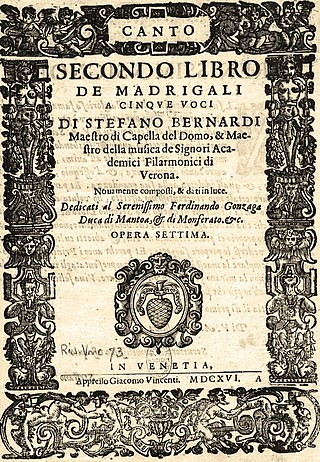Related Research Articles

Adriano Banchieri was an Italian composer, music theorist, organist and poet of the late Renaissance and early Baroque eras. He founded the Accademia dei Floridi in Bologna.
Andrea Gabrieli was an Italian composer and organist of the late Renaissance. The uncle of the somewhat more famous Giovanni Gabrieli, he was the first internationally renowned member of the Venetian School of composers, and was extremely influential in spreading the Venetian style in Italy as well as in Germany.

Salamone Rossi or Salomone Rossi was an Italian Jewish violinist and composer. He was a transitional figure between the late Italian Renaissance period and early Baroque.
Sigismondo d'India was an Italian composer of the late Renaissance and early Baroque eras. He was one of the most accomplished contemporaries of Monteverdi, and wrote music in many of the same forms as the more famous composer.
Pomponio Nenna was a Neapolitan Italian composer of the Renaissance. He is mainly remembered for his madrigals, which were influenced by Gesualdo, and for his polychoral sacred motets, posthumously published as Sacrae Hebdomadae Responsoria in 1622.

Maddalena Casulana was an Italian composer, lutenist and singer of the late Renaissance. She is the first female composer to have had a whole book of her music printed and published in the history of western music.

Ruggiero Giovannelli was an Italian composer of the late Renaissance and early Baroque eras. He was a member of the Roman School, and succeeded Palestrina at St. Peter's.

Giovanni Maria Trabaci was an Italian composer and organist. He was a prolific composer, with some 300 surviving works preserved in more than 10 publications; he was especially important for his keyboard music.
Giovanni Girolamo Kapsperger was an Austrian-Italian virtuoso performer and composer of the early Baroque period. A prolific and highly original composer, Kapsberger is chiefly remembered today for his lute and theorbo (chitarrone) music, which was seminal in the development of these as solo instruments.
Giovanni Battista Conforti was an Italian composer, born either in Bologna or Parma. In the dedication to his Primo libro de ricercari a quattro voci he says that he "owes much" to Cardinal Niccolò Caetani of Sermoneta, for whom he had probably worked in Rome.
Cesarina Ricci de Tingoli was an Italian composer of the Baroque period.
The decade of the 1540s in music involved some significant events.
Alessandro Orologio (1551–1633) was an Italian composer and instrumentalist, who lived in German lands.
Simone Molinaro was a composer of the late Renaissance in Italy. He was especially renowned for his lute music.
Aquilino Coppini was an Italian musician and lyricist. While in the service of Cardinal Federico Borromeo, he specialized in creating sacred contrafacta of secular madrigals. His contrafacta are of interest for their concentration on Monteverdi's madrigals and for the form in which he treats the poetic text. According to Antonio Delfino, "rather than simply replacing the original text with a liturgical one, he ‘spiritualized’ then through a careful translation which, like an exercise in rhetorical expertise, reproduces the phonemes, accents and rhythms of the secular text." In a letter to Hendrik van den Putten published in Epistolarum libri sex (1613), Coppini says that "the Monteverdi pieces need longer pauses, resting occasionally, allowing retardation, and at times even pressing on. There is in them a wonderful power to move the passions exceedingly."

Antonio Brunelli was an Italian composer and theorist of the early Baroque period.

Stefano de Maza Gatto also known as Stefano Felis, was a Neapolitan Italian composer of the Renaissance, and the collaborator and probable teacher of composer Pomponio Nenna. He composed madrigals, sacred motets, and choral settings of the Mass.
Agostino Agresta was a Neapolitan composer working at the beginning of the 17th century, who can be seen as having been strongly influenced by Carlo Gesualdo. Agresta's only known surviving works are unaccompanied madrigals, including a complete book of six-voice pieces.

StefanoBernardi, also known as "il Moretto", was an Italian priest, composer and music theorist. Born in Verona and maestro di cappella at the Verona Cathedral from 1611 to 1622, he later moved to Salzburg, where he was responsible for the music at the Salzburg Cathedral and composed a Te Deum for 12 choirs performed at the cathedral's consecration in 1628.
References
- ↑ "Vecoli [Veccoli]" . Grove Music Online. Oxford University Press. Retrieved 20 January 2016.
- 1 2 Sainsbury, J (1824). A Dictionary of Musicians: From the Earliest Ages to the Present Time. p. 502. Retrieved 20 January 2016.
- ↑ "Pietro Vecoli". Presto Classical. Retrieved 20 January 2016.